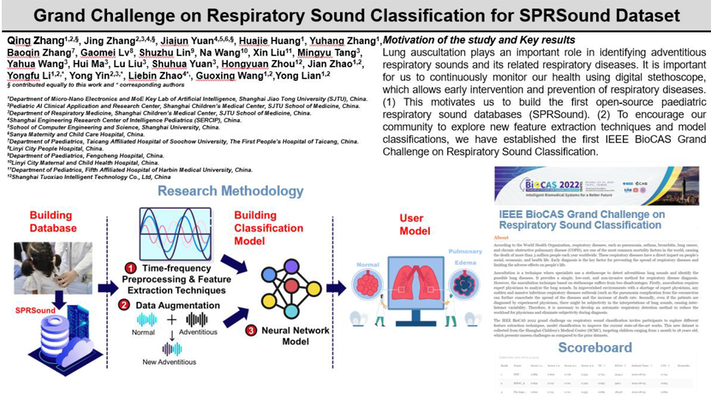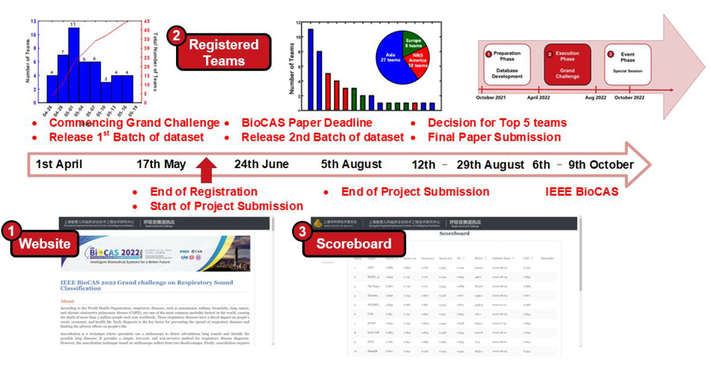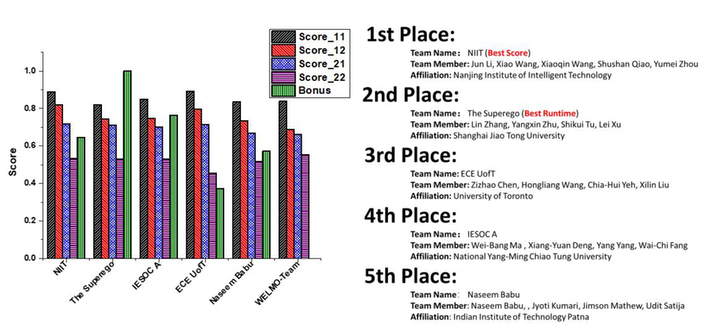IEEE BioCAS Grand Challenge 2022
The IEEE BioCAS conference has organized the first grand challenge on respiratory sound classification [1] using the opensource SJTU pediatric respiratory sound dataset (SPRSound) (Fig. 1) [2]. The event brought together 45 teams with over 100 participants from all over the world to explore different types of feature extraction and classification algorithms, pushing the boundaries of the current state-of-the-art. The registration phase starts from 1st April to 17th May 2022. The timeline of the grand challenge of respiratory sound classification is summarized in Fig. 2.
We have provided the following guidelines to ensure fairness and transparency among our participants. (i) Submission portal and repository websites are only accessible to contestants to prevent non-essential downloading and sharing of datasets before the contest ends. (ii) Teams that did not submit their initial papers to IEEE BioCAS will not be able to access the repository prior to the release of the second dataset. (iii) Each team can only submit one entry per day and the scoreboard updates based on their best entry. This prevents the team from analyzing the relationship between their classification models and their corresponding results.
We have organized a special session to allow the teams to submit their paper. We have adopted the same review process as regular submissions in order to ensure a high quality of submissions. The second round of review for the selected paper will ensure a higher quality submission since the models and content might need to be adjusted after the initial paper submission deadline. Finally, the top 5 teams are invited to present their work in the IEEE BioCAS 2022 and compete for the top prizes.
The final was held in virtual format from 16:00 to 17:30 (GMT+8) on Saturday, October 15 2022 during the IEEE BioCAS conference (https://biocas2022.org/). During the live session, each team has 15 minutes for their presentation and 5 minutes for Q&A. The result was announced during the BioCAS Closing Ceremony from 18:00 to 18:30 (GMT+8) on Saturday, October 15, 2022. The winning teams are being awarded a total prize money of $10,000 USD and the selected papers will be invited for the IEEE TBioCAS Journal. We will be announcing new details with regards to the IEEE BioCAS Grand Challenge 2023 soon.

Fig 1: Ovierview of Grand Challenge on Respiratory Sound Classification.

Fig. 2: Timeline of Grand Challenge on Respiratory Sound Classification.

Fig. 3: Top 5 Winners of the IEEE BioCAS Grand Challenge 2022
2022 IEEE CASS BioCAS Grand Challenge Winner
1st Prize, Best Overall and Score
NIIT: Improving the ResNet-Based Respiratory Sound Classification Systems with Focal Loss [3]
Jun Li1, Xiao Wang2, Xiaoqin Wang3, Shushan Qiao3, Yumei Zhou3
1 Nanjing Institute of Intelligent Technology, China;
2 University of Chinese Academy of Sciences, China;
3 Institute of Microelectronics of the Chinese Academy of Sciences, China.
2nd Prize, Best Runtime
The Superego: A Feature Polymerized Based Two-Level Ensemble Model for Respiratory Sound Classification [4]
Lin Zhang, Yangxin Zhu, Shikui Tu, Lei Xu
Shanghai Jiao Tong University, China.
3rd Prize
IESOC: An Effective Lung Sound Classification System for Respiratory Disease Diagnosis Using DenseNet CNN Model with Sound Pre-Processing Engine [5]
Wei-Bang Ma, Xiang-Yuan Deng, Yang Yang, Wai-Chi Fang
National Yang Ming Chiao Tung University, Taiwan.
4th Prize
ECE UofT: Classify Respiratory Abnormality in Lung Sounds Using STFT and a Fine-Tuned ResNet18 Network [6]
Zizhao Chen, Hongliang Wang, Chia-Hui Yeh, Xilin Liu
University of Toronto, Canada.
5th Prize
Naseem Babu: Multiclass Categorisation of Respiratory Sound Signals Using Neural Network [7]
Naseem Babu, Jyoti Kumari, Jimson Mathew, Udit Satija, Arijit Mondal
Indian Institute of Technology Patna, India.
References
[1] Q. Zhang, J. Zhang et al., “Grand Challenge on Respiratory Sound Classification for SPRSound Dataset,” in IEEE Biomedical Circuits and Systems Conference (BioCAS), Oct. 2022, pp. 213–217.
[2] Q. Zhang, J. Zhang et al., “SPRSound: Open-Source SJTU Paediatric Respiratory Sound Database,” IEEE Transactions on Biomedical Circuits and Systems, vol. 16, no. 5, pp. 867–881, Oct. 2022.
[3] J. Li, X. Wang et al., “Improving The ResNet-based Respiratory Sound Classification Systems With Focal Loss,” in IEEE Biomedical Circuits and Systems Conference (BioCAS), Oct. 2022, pp. 223–227.
[4] L. Zhang, Y. Zhu et al., “A Feature Polymerized Based Two-Level Ensemble Model for Respiratory Sound Classification,” in IEEE Biomedical Circuits and Systems Conference (BioCAS), Oct. 2022, pp. 238–242.
[5] W.-B. Ma, X.-Y. Deng et al., “An Effective Lung Sound Classification System for Respiratory Disease Diagnosis Using DenseNet CNN Model with Sound Pre-processing Engine,” in IEEE Biomedical Circuits and Systems Conference (BioCAS), Oct. 2022, pp. 218–222.
[6] Z. Chen, H. Wang et al., “Classify Respiratory Abnormality in Lung Sounds Using STFT and a Fine-Tuned ResNet18 Network,” in IEEE Biomedical Circuits and Systems Conference (BioCAS), Oct. 2022, pp. 233–237.
[7] N. Babu, J. Kumari et al., “Multiclass Categorisation of Respiratory Sound Signals Using Neural Network,” in IEEE Biomedical Circuits and Systems Conference (BioCAS), Oct. 2022, pp. 228–232.
Yongfu Li and Yong Yin
Shanghai Jiaotong University, China.